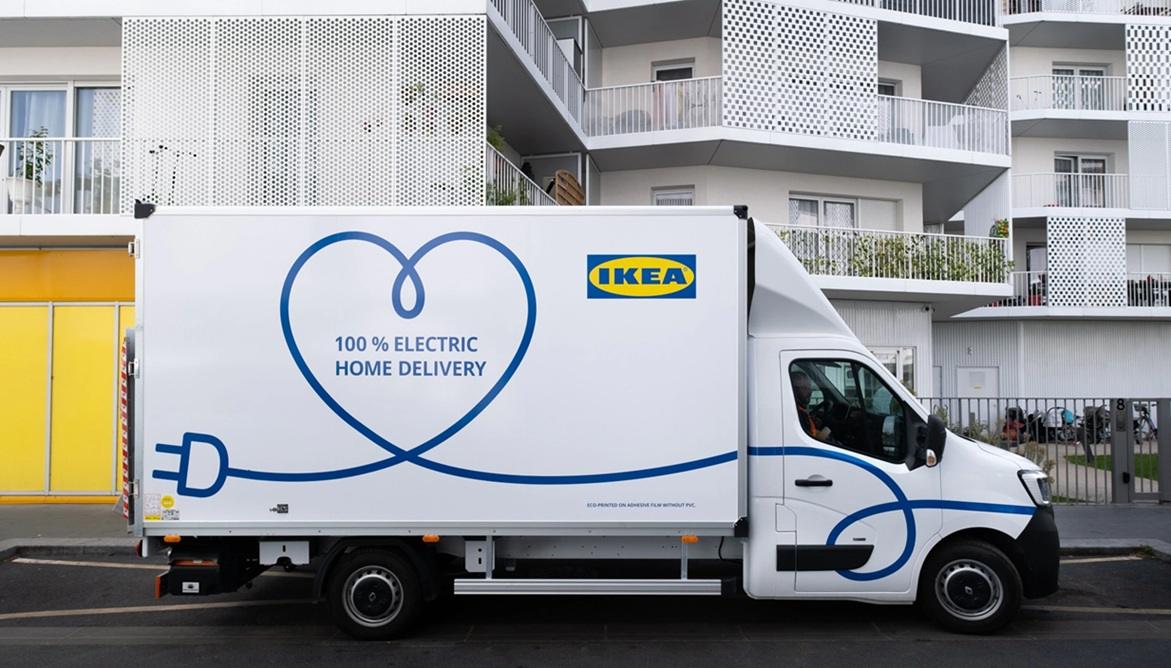IKEA Pushes Back Zero Emissions Delivery Target
IKEA parent INGKA Group announced that is has adjusted one of its climate goals, replacing its target to reach 100% emission-free home deliveries by 2025, with a new ambition to achieve more than 90% of home deliveries made by zero-emissions vehicles by 2028, citing a variety of factors including a rapid increase in online orders, and the availability of electric vehicles and charging infrastructure.
Home deliveries account for approximately 14% of Ingka’s mobility emissions, and the goals form part of the company’s targets to reduce its overall mobility emissions by 40% by 2030, reduce greenhouse gas (GHG) emissions across its value chain by 50% by 2030, and to reach net zero by 2050.
Ingka Group set its initial zero-emission deliveries goal in 2028, and the company highlighted its achievements in this area, including reaching more than 41% of retail home deliveries with zero emissions vehicles in 2024, up significantly from less than 25% in 2023, as well as reaching 100% emission-free deliveries in 20 cities.
Despite the progress, however, in a blog post discussing the changed target, Karen Pflug, Chief Sustainability Officer at Ingka Group said that the updated goals “now reflect the wider global challenges faced in the electric vehicle sector,” including a “lack of charging infrastructure, differing local policies and a limited range of freight electric vehicles (EVs).”
Pflug added:
“These challenges are the reasons why we have now stated 90% and not 100%. We believe we can state more than 90% with confidence that many of our markets will exceed this target, but we also recognise some challenges may remain in some countries.”
The new target was included in Ingka Group’s recently published Net Zero Transition Plan, which provided a detailed roadmap to decarbonize all aspects of its value chain. Key initiatives outlined in the transition plan to hit its reduced emissions delivery goal included engaging with truck manufactures on the development of their EV ranges and testing new vehicles as they are developed, supporting third party delivery partners to increase use of EVs and alternative fuel vehicles, use route optimization to reduce distance travelled by delivery vehicles, insource some home deliveries using the company’s own zero emission vehicles, and other local plans.
In her post,Pflug added that the company has introduced a dedicate project manager working on zero emissions home delivery in each of the company’s retail countries to address local challenges, and that Ingka Group is also advocating for policy changes to help overcome barriers to the zero emission transition, such as setting 2035 target dates for the phase-out for internal combustion engine cars and vans, encouraging alternative fuels such as green hydrogen and sustainable biofuels for long haul transportation, increasing the provision of charging infrastructure, and supporting research and development of sustainable biofuels, as well as other zero emission technologies.
Pflug said:
“We still believe that zero emission deliveries are the future of retail. As we look ahead and work with our new targets, through continued investment, innovation and collaboration we remain strongly committed to our customers that their home deliveries will be made by zero emission vehicles.”





